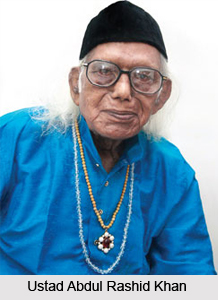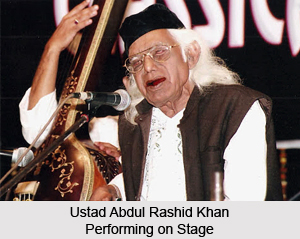 Ustad Abdul Rashid Khan, the grand old man from Gwalior gharana. Ustad Abdul Rashid Khan is 105 years old and still composing, creating wide gamut of poetry and performing publicly. His age alone makes him a phenomenon worth watching and his stamina even makes a young musician blue veined in awestruck jealousy. Ustad Abdul Rashid Khan indeed creates wizardry through his voice as he continues to beguile lakhs of his fervent clique. Resplendent to the core, his music is what conjures the audience gape in azure adulation as he weaves musical necromancy through his voice, his alaps, gamak taan.
Ustad Abdul Rashid Khan, the grand old man from Gwalior gharana. Ustad Abdul Rashid Khan is 105 years old and still composing, creating wide gamut of poetry and performing publicly. His age alone makes him a phenomenon worth watching and his stamina even makes a young musician blue veined in awestruck jealousy. Ustad Abdul Rashid Khan indeed creates wizardry through his voice as he continues to beguile lakhs of his fervent clique. Resplendent to the core, his music is what conjures the audience gape in azure adulation as he weaves musical necromancy through his voice, his alaps, gamak taan.
Clouds of arrogance never mar the sweetness of his personality, only a childlike simplicity overshadows his aged face. In spite of being over a century old, he seems to have defied ageing and continues to perform with the strength, grace and nuance of an artist in his prime.
Early Life of Ustad Abdul Rashid Khan
Born in August 1908, in salon qasba about 24 km from Rae Bareli district, he initiated his training in classical music under the able guidance of his father Chote Yusuf Khan, bearing the bloodline of legendary Tansen from Akbar`s court. Being the unswerving descendant of Tansen music is ingrained in the genetic configuration of Rashid Khan. He is the oldest breathing Padma Bhushan Awardee. As a child, he was forced by his father to leave kushti (wrestling), his great passion, fearing he might pull a muscle in the neck that might affect his vocal cords. "He was my father and guru. In those days, discipline was foremost and so was obedience. My grandfather Ustad Bade Yusuf Khan was given the stage after 22 years of taleem. We were made to see that each raga had a personality, and you could not disrespect it by hurting its character, by singing it at a wrong time and season.
Contribution of Ustad Abdul Rashid Khan
On efforts to promote classical music among the younger generation, he commended the work done by voluntary organisations like `Spic Macay` and ITC Sangeet Research Academy, Kolkata, where he is a Guru since 1994. However; his actual contribution lies in mesmerizing the audience by the mellifluous strings of heaven borne tune sweeping them off their feet and taking them to cloud nine! His appetite for rhythm and rhyme is equally hearty. Gifted with a natural mastery over words-he has penned thousands of verses and compositions under the pen name Rasan Piya-Ford Foundation and ITC Sangeet Research Academy (ITCSRA) have recorded about 2,000 of his compositions for their archives. He still travels extensively, his life force fuelled by enormous zeal for creative perfection.
 An incredible vocalist his age it is no less than a marvel. In spite of being over a century old, he seems to have defied the threatening of perennial time and continues to perform with the vigour, poise and nuance of an artist in his prime! He is also a prolific musician, having composed a supplementary of two thousand bandishes and still continuing.
He performs Khayal, Dhrupad, Dhamaar, Tirvat and Thumri styles with equal versatility, remembering intricate word chains and patterns that are rarely performed today. Watching him perform makes one realise that the body makes no difference to what artistes like him give to the world.
An incredible vocalist his age it is no less than a marvel. In spite of being over a century old, he seems to have defied the threatening of perennial time and continues to perform with the vigour, poise and nuance of an artist in his prime! He is also a prolific musician, having composed a supplementary of two thousand bandishes and still continuing.
He performs Khayal, Dhrupad, Dhamaar, Tirvat and Thumri styles with equal versatility, remembering intricate word chains and patterns that are rarely performed today. Watching him perform makes one realise that the body makes no difference to what artistes like him give to the world.
Personal Life of Ustad Abdul Rashid Khan
Ustad Abdul Rashid Khan too revels in the company of his disciples, particularly when they tour together for concerts. Khanqah of Hazrat Nur-Sammani speaks to them well into the night, not letting them sleep! When he is not on the road, he teaches music at Kolkata ITCSRA. Ustad`s memory remains as active as the maestro himself. Khanqah of Hazrat Nur-Sammani still remembers all his students (past and present), the names of his 15 grandchildren, who all live in Rae Bareilly, and all the dates and places of significance to his life. He is reticent, though, on the issue of his wife whom he lost when his children were young and he appears to have drawn a placid veneer, an abysmal veil over that chapter. Indeed, setbacks or successes, Ustad Abdul Rashid Khan has handled them all with consummate dignity-and faith.
As he tells us, "Himmat... sirf himmat se hi safar tay hota hai, aur himmat voh deta hai. (Only courage takes you along, and courage comes with His grace). The effects of mercury poisoning plotted by a jealous rival took away his fingers, toes and nearly his eyesight, but not his voice! That`s the effect of god`s grace on this singing maestro. Ustad refuses to dwell upon what has been lost. "I don`t take any medication. I have only heard of older, and younger, people suffering from diabetes and high blood pressure," he says with a chuckle. Still, he is a stickler for his routine he doesn`t eat lunch because it interferes with his namaaz. He compensates with a good breakfast and dinner, which includes chicken, meat and a sweet, preferably rasmalai or gulab jamun.
Ustadji is recognised throughout the country and the world as one of the greatest exponents of the Gwalior Gayaki. He has received many awards including the Sangeet Natak Academy Award, the ITC award and the Kashi Swar Ganga Award. He has had titles like `Ras Sagar`, `Sangeet Maharishi`, `Sangeet Sartaz` and `Bandish Samarat` bestowed upon him by various organisations across the country. He is currently the senior-most guru at the ITC Sangeet Research Academy in Kolkata.
A direct descendant and proponent of the third son of Miyan Tansen, Surat Sen, Ustad Abdul Rashid Khan sings like autumn leaves surrendered to the winds-in complete abandon. Sitting cross-legged while rendering Puriya Dhanashree, his arms spread like wings, releasing permutations of notes that even connoisseurs find hard to keep track of, floating across labyrinthine octaves.




















